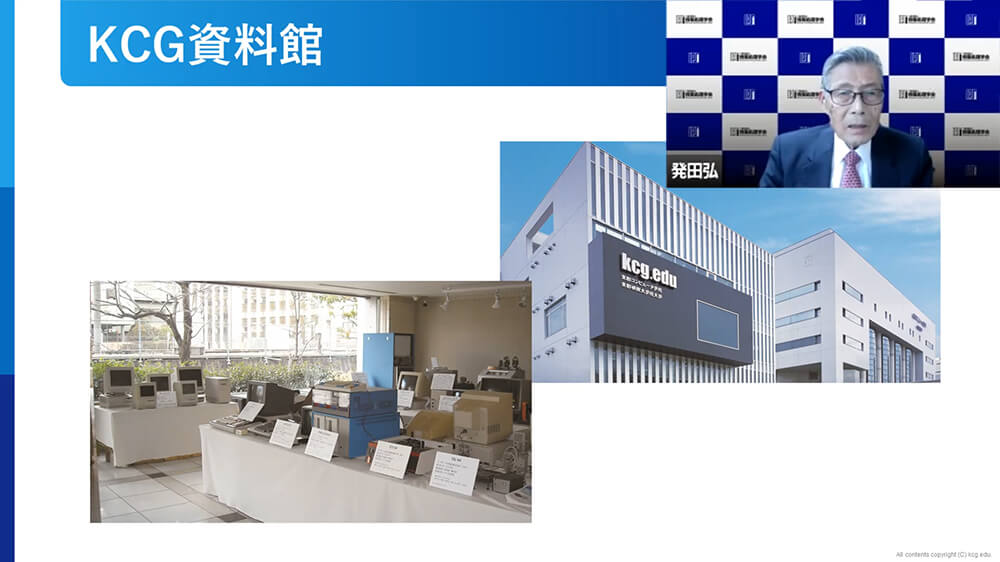
The KCG Group, consisting mainly of Kyoto Computer Gakuin (KCG), Kyoto Computer Guraduate Institute of Informatics (KCGI), and Kyoto College of Gear Technology (KCGM), endorsed the purpose of the newly established "Digital Days" (October 10-11) and held an online commemorative lecture organized by the group on October 10, 2021, the first day of the event.Mr. Hiroshi Hatta, Chairman of the History Special Committee of the Information Processing Society of Japan (Chairman: Hideyuki Tokuda), which is co-sponsoring the symposium, gave a presentation titled "Uncovering the History of Computer Development in Japan," introducing historical documents from the KCG Museum, where equipment used by KCG since its founding in 1963 is preserved and displayed, and explaining the history of computer development in Japan.In 2009, the KCG Museum received the nation's first "Distributed Computer Museum" accreditation from the society for being "one of the best facilities in Japan that preserves a large number of valuable equipment.So far, seven models have been certified as "Information Technology Heritage" and are on display at KCG Kyoto Ekimae School.
Digital Day was established this year with the launch of the Digital Agency as an opportunity to regularly reflect on, experience, and review the digital world.In order to realize "human-friendly digitization that leaves no one behind," industry, government, academia, and individuals are working together to create a festival for the entire nation.On October 10 and 11, chosen because digital technology is processed with "0s" and "1s," the government, educational institutions, and sponsors are planning and conducting events.This presentation by the KCG group was open not only to students, faculty and staff, but also to the general public who had registered in advance.
After working for NEC and Oki Electric, Mr. Hatta served as a member of various committees, director, auditor, and vice president of the Information Processing Society of Japan (IPSJ), and has served as the chairman of the Special Committee on History since 2006.He has also contributed to KCG Group's alumni magazine, "Accume.
In his speech, Mr. Hatta said, "The development of computers in Japan began in the 1950s, and there are many achievements that Japan is proud of in the world.One of the records of the history of development is the Computer Museum on the website of the Information Processing Society of Japan, which contains photos and articles, but no actual products.The reality is that most have been discarded and are no longer in this world, and those that barely remain are being discarded day by day.It would be nice to have a real museum with computers to preserve valuable historical documents, but this is very difficult to achieve.The result of our consideration of what to do is the recognition of the 'Information Technology Heritage' and the 'Distributed Computer Museum'," he said.Then, the details of each technological heritage and each dispersed museum will be explained along the history.Regarding the KCG Museum, he said, "It is the largest of the distributed computer museums and the most magnificent, with many historical documents preserved and exhibited.He praised the museum, saying, "There are many historical documents that have been recognized as heritage of information processing technology, and at the same time, the museum preserves and exhibits computers that have been used for education and training since the founding of Kyoto Computer Gakuin, so you can really feel the history of computers.
KCG, the first computer education institution in Japan, opened the "KCG Museum" on campus in 1998, collecting the general-purpose computers, personal computers, and peripheral equipment used by students for their practical training.We are calling for support and cooperation from the national government, Kyoto Prefecture, Kyoto City, academic societies, the educational community, and businesses with the aim of realizing the "KCG Computer Museum" in the future.
In 2020, the Federation of IT Organizations of Japan, of which KCG Group President Wataru Hasegawa serves as representative director and first vice president, and the Information Processing Society of Japan (IPSJ), Japan's largest academic organization dedicated to the promotion and dissemination of information processing science and technology, concluded an agreement on industry-academia cooperation projects.Supervisory Director Hasegawa becomes a member of the Society's Board of Directors.Both parties cooperate to promote IT human resource development, engineer training, and in-house education for the new era, as well as to promote remote and home medical care using IT.
A video of the lecture is available on YouTube.
Digital Day Commemorative Lecture - A Brief History of Computer Development in Japan - YouTube
https://www.youtube.com/watch?v=-pxzPBDPuZsKCG Museum